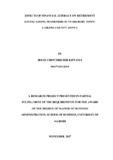| dc.contributor.author | Kiptanui, Irene C | |
| dc.date.accessioned | 2018-01-31T12:25:41Z | |
| dc.date.available | 2018-01-31T12:25:41Z | |
| dc.date.issued | 2017 | |
| dc.identifier.uri | http://hdl.handle.net/11295/103024 | |
| dc.description.abstract | Financial literacy is the capability to make cognizant decisions and to consider effective choices concerning the usage and management of cash. Financial literacy is important for retirement saving. The retirees are faced with optimization problem in the current economic conditions and inadequate information. Pensioners in nyahururu are classified into three classes, upper class, middle class and lower class. Access to financial management skills and general education programs is part of many challenges encountered by individuals in their quest to improve their level of knowledge on saving for retirement lifestyle. The study main objective of the study was to determine effect of financial literacy on retirement saving among pensioners in Nyahururu town. The theories and concepts guiding this study include the lifecycle hypothesis and permanent income hypothesis. The study adopted descriptive research designs. The target population included 700 pensioners residing in Nyahururu town. Cluster sampling was applied in this study to obtain a sample size of 255. Primary data was gathered using a simple structured questionnaire. Data collected was analysed quantitatively. The study established that financial literacy, age, education and income level positively affect retirement saving while gender negatively affects retirement savings among pensioners in Nyahururu town. The study concludes that pension finance literacy amongst pensioners in Nyahururu town stood at almost half of the population. The study recommends that organizations in both private and public sectors should ensure financial literacy programs are put into practice so that workers are provided with information about the difficulties that would befall them during their retirements and also how to cope with the challenges as well as how to effectively utilize their time while in retirement. In particular, financial literacy programs should focus on younger workers who constitute the bulk of employees so that the can be able to make informed decision while they are still very productive. In addition, new employees should be acquainted to the arrangements of pension by their employers to motivate them into making retirement savings. | en_US |
| dc.language.iso | en | en_US |
| dc.publisher | University of Nairobi | en_US |
| dc.rights | Attribution-NonCommercial-NoDerivs 3.0 United States | * |
| dc.rights.uri | http://creativecommons.org/licenses/by-nc-nd/3.0/us/ | * |
| dc.title | Effects of Financial Literacy on Retirement Saving Among Pensioners in Nyahururu Town-Laikipia County, Kenya | en_US |
| dc.type | Thesis | en_US |



